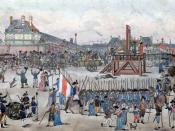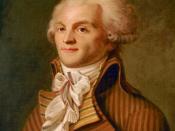By 1789 the French monarchy was nearly powerless and, for all intensive purposes, the National Assembly was the current government of France. Maximilien Robespierre encouraged the people of the Third Estate to take action, resulting in such events as the storming of the Bastille in Paris and in acts of violence out in the French countryside. The vast majority of the French population supported Robespierre's efforts. His popularity grew further as he gave speeches to the public about the issues of French society, such as suffrage and equal rights for all, regardless of race or religion. Robespierre had a reputation of being the most honest leader of the revolution and became known as "incorruptible" for his fair attitude towards all (Schama 19). In 1791 the National Assembly had created a constitution that would limit the King's power in France, however the royal family had attempted to flee rather then sign it.
The King was arrested and taken officially out of power. As a leader in the Jacobin Political party, Robespierre campaigned strongly to have Louis XVI punished for his actions, culminating in a speech which brought almost total support for the end of the French monarchy and stopped the growth of the political parties, such as the Girondists, which wished to replace the monarchy with a new constitution (Loomis 8). The French people no longer wanted to be ruled by a King, and they showed it in an overwhelming vote for the Jacobin Party. As Robespierre once said, "Europe cannot conceive of life without kings and nobles; and we cannot conceive of it with them. Europe is lavishing her blood to preserve her chains, whereas we are lavishing ours to destroy them"(Loomis 1). The French people were done with their King, but that statement made the other European monarchs nervous.


